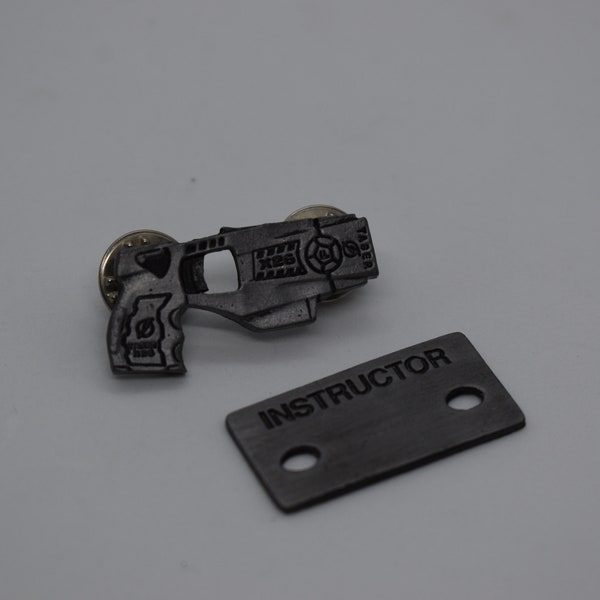Taser master instructor is a highly specialized and respected role in law enforcement and private security sectors. This position involves more than just training others in the use of tasers; it requires a deep understanding of the technology, safety protocols, and legal considerations surrounding its use. If you're interested in this field, you're in the right place.
As the world evolves and law enforcement agencies seek more non-lethal methods of subduing suspects, the demand for skilled taser instructors has risen significantly. The role of a taser master instructor is crucial in ensuring that officers and security personnel are well-trained and capable of handling tasers effectively and responsibly.
This comprehensive guide will walk you through everything you need to know about becoming a taser master instructor, from the required qualifications and training to the responsibilities and benefits of the role. By the end of this article, you'll have a clear understanding of what it takes to excel in this profession.
Read also:Master The Art Of Pollo Agridulce A Sweet And Savory Culinary Delight
Table of Contents:
- What is a Taser Master Instructor?
- The History of Taser Technology
- Qualifications Required
- The Training Process
- Key Responsibilities
- Legal Aspects of Taser Use
- Benefits of Being a Taser Master Instructor
- Career Opportunities
- Challenges in the Role
- Conclusion
What is a Taser Master Instructor?
A taser master instructor is a highly trained professional responsible for educating law enforcement officers, military personnel, and private security agents on the proper use of tasers. These instructors are not only experts in taser technology but also in teaching techniques that ensure trainees understand the importance of safety, legal compliance, and effective deployment.
Role and Importance
Taser master instructors play a vital role in minimizing the risks associated with taser use. They ensure that individuals are well-versed in the device's operation, maintenance, and appropriate situations for deployment. Their expertise helps reduce the likelihood of accidents and enhances the effectiveness of non-lethal force options.
The History of Taser Technology
The development of taser technology dates back to the 1970s when it was first introduced as a non-lethal alternative to firearms. Over the decades, advancements in technology have made tasers more reliable, safer, and more widely adopted by law enforcement agencies worldwide.
Evolution of Taser Devices
- First Generation: Basic models with limited range and functionality.
- Second Generation: Introduced features like improved accuracy and longer battery life.
- Third Generation: Integrated data collection and video recording capabilities.
Qualifications Required
Becoming a taser master instructor requires specific qualifications and certifications. These include a combination of educational background, practical experience, and specialized training.
Key Qualifications
- Law enforcement or military experience.
- Completion of certified taser training programs.
- Proven teaching abilities and communication skills.
The Training Process
The journey to becoming a taser master instructor involves rigorous training and continuous learning. This section outlines the steps involved in this process.
Read also:Valeria Castellana The Rising Star Of Italian Cinema
Steps to Become a Certified Instructor
Step one involves enrolling in a certified taser training program offered by recognized institutions. These programs cover theoretical knowledge, hands-on practice, and assessment of skills. After completing the initial training, candidates must undergo periodic re-certifications to stay updated with the latest advancements in taser technology.
Key Responsibilities
Taser master instructors have a wide range of responsibilities that go beyond teaching. They must ensure that all trainees are thoroughly prepared to handle real-world situations involving tasers.
Duties of an Instructor
- Designing and delivering comprehensive training programs.
- Monitoring trainee progress and providing feedback.
- Maintaining records of training sessions and certifications.
Legal Aspects of Taser Use
Understanding the legal framework surrounding taser use is crucial for taser master instructors. They must be well-versed in local, national, and international laws governing the deployment of tasers.
Legal Considerations
According to a report by the National Institute of Justice, proper training significantly reduces the incidence of misuse and legal challenges. Instructors must emphasize the importance of adhering to legal guidelines during training sessions.
Benefits of Being a Taser Master Instructor
There are numerous benefits to pursuing a career as a taser master instructor. These include job security, competitive salaries, and opportunities for professional growth.
Professional Advantages
- Opportunities to work with cutting-edge technology.
- Networking with other professionals in the field.
- Contributing to safer communities through effective training.
Career Opportunities
The demand for taser master instructors continues to grow as more agencies adopt tasers as part of their non-lethal force options. This section explores the various career paths available in this field.
Potential Career Paths
- Law enforcement training specialist.
- Private security consultant.
- Military tactical instructor.
Challenges in the Role
Despite the many advantages, there are challenges associated with being a taser master instructor. These include staying updated with rapidly evolving technology and addressing public concerns about taser use.
Addressing Challenges
Continuous education and open communication with stakeholders are key to overcoming these challenges. Instructors must be proactive in addressing concerns and ensuring that training programs are relevant and effective.
Conclusion
Taser master instructors play a critical role in enhancing the safety and effectiveness of law enforcement and security operations. By understanding the history, qualifications, responsibilities, and legal aspects of taser use, aspiring instructors can prepare themselves for a rewarding career in this field.
Call to Action: If you're interested in learning more about becoming a taser master instructor, we encourage you to explore the resources mentioned in this article. Feel free to leave a comment or share this article with others who might find it useful. Together, we can promote safer communities through effective training and education.
For further reading, consider checking out other articles on our site that delve into related topics such as law enforcement technology and non-lethal force options.
References:
- National Institute of Justice. (2022). Taser Technology: A Review of the Evidence.
- Axon. (2023). Taser Training Programs and Certifications.


